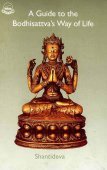Bodhi, Bodhī: 25 definitions
Introduction:
Bodhi means something in Buddhism, Pali, Hinduism, Sanskrit, Jainism, Prakrit, the history of ancient India, biology. If you want to know the exact meaning, history, etymology or English translation of this term then check out the descriptions on this page. Add your comment or reference to a book if you want to contribute to this summary article.
Images (photo gallery)
(+31 more images available)
In Hinduism
Ayurveda (science of life)
Veterinary Medicine (The study and treatment of Animals)
Source: Shodhganga: Portrayal of Animal Kingdom (Tiryaks) in Epics An Analytical studyBodhi (बोधि) (lit. “one who [awakens?]”) is a synonym (another name) for the Kukkuṭa, according to scientific texts such as the Mṛgapakṣiśāstra (Mriga-pakshi-shastra) or “the ancient Indian science of animals and birds” by Hamsadeva, containing the varieties and descriptions of the animals and birds seen in the Sanskrit Epics such as the Ramayana and Mahabharata.

Āyurveda (आयुर्वेद, ayurveda) is a branch of Indian science dealing with medicine, herbalism, taxology, anatomy, surgery, alchemy and related topics. Traditional practice of Āyurveda in ancient India dates back to at least the first millenium BC. Literature is commonly written in Sanskrit using various poetic metres.
In Buddhism
Theravada (major branch of Buddhism)
Source: Pali Kanon: Pali Proper NamesBodhi is the name of a daughter of Kassapa I. Cv.xxxix.11.
Source: Pali Kanon: Manual of Buddhist Terms and DoctrinesBodhi (from verbal root budhi, “to awaken”, “to understand”):—awakenment, enlightenment, supreme knowledge. "(Through Bodhi) one awakens from the slumber or stupor (inflicted upon the mind) by the defilements (kilesa) and comprehends the Four Noble Truths (sacca)" (Com. to M. 10). [...] The enlightenment of a Buddha is called sammā-sambodhi, 'perfect enlightenment'. The faith (saddhā) of a lay follower of the Buddha is described as "he believes in the enlightenment of the Perfect One" (saddahati Tathāgatassa bodhim: M.53, A.III.2).
There is a threefold classification of enlightenment:
- that of a noble disciple (sāvaka-bodhi, q.v.). i.e. of an Arahat,
- of an Independently Enlightened One (pacceka-bodhi, q.v.), and
- of a Perfect Enlightened One (sammā-sambodhi).
This 3-fold division, however, is of later origin, and in this form it neither occurs in the canonical texts nor in the older Sutta commentaries. The closest approximation to it is found in a verse sutta which is probably of a comparatively later period, the Treasure Store Sutta (Nidhikkanda Sutta) of the Khuddakapātha, where the following 3 terms are mentioned in stanza 15: sāvaka-pāramī, pacceka-bodhi, buddha-bhūmi (see Khp. Tr., pp. 247f.).
The commentaries (e.g. to M., Buddhavamsa, Cariyapitaka) generally give a 4-fold explanation of the word bodhi:
- the tree of enlightenment,
- the holy path (ariya-magga),
- Nibbāna,
- omniscience (of the Buddha: sabbaññutā-ñāna).
As to (2), the commentaries quote Cula-Nidesa where bodhi is defined as the knowledge relating to the 4 paths (of Stream-entry, etc.; catūsu maggesu ñāna). [...] Neither in the canonical texts nor in the old commentaries is it stated that a follower of the Buddha may choose between the three kinds of enlightenment and aspire either to become a Buddha, a Pacceka-Buddha, or an Arahat-disciple. This conception of a choice between three aspirations is, however, frequently found in present-day Theravāda countries, e.g. in Sri Lanka.
Theravāda is a major branch of Buddhism having the the Pali canon (tipitaka) as their canonical literature, which includes the vinaya-pitaka (monastic rules), the sutta-pitaka (Buddhist sermons) and the abhidhamma-pitaka (philosophy and psychology).
Tibetan Buddhism (Vajrayana or tantric Buddhism)
Source: Wisdom Library: Tibetan BuddhismBodhi (बोधि) is the name of a Rāśi (zodiac sign) mentioned as attending the teachings in the 6th century Mañjuśrīmūlakalpa: one of the largest Kriyā Tantras devoted to Mañjuśrī (the Bodhisattva of wisdom) representing an encyclopedia of knowledge primarily concerned with ritualistic elements in Buddhism. The teachings in this text originate from Mañjuśrī and were taught to and by Buddha Śākyamuni in the presence of a large audience (including Bodhi).
Source: Wisdomlib Libary: VajrayoginiBodhi (बोधि) is the name of the tree (vṛkṣa) associated with Gahvara: the northern cremation ground (śmaśāna) according to the Vajravārāhī-sādhana by Umāpatideva as found in te 12th century Guhyasamayasādhanamālā. The tree associated with the north is sometimes given as Aśvattha. As a part of this sādhana, the practicioner is to visualize a suitable dwelling place for the goddess inside the circle of protection which takes the form of eight cremation grounds.
These trees (e.g., Bodhi) that are associated with the cremation grounds are often equated with the eight bodhi-trees of the Buddhas (the current buddha plus the seven previous one). According to the Śmaśānavidhi each tree has a secondary tree (upavṛkṣa) that is depicted as lovely and covered in vaṅga flowers and fruit. In each tree lives a naked rākṣasa who is wrathful in form, who eats human flesh and who has the animal face or the mount of the dikpati in his cremation ground.

Tibetan Buddhism includes schools such as Nyingma, Kadampa, Kagyu and Gelug. Their primary canon of literature is divided in two broad categories: The Kangyur, which consists of Buddha’s words, and the Tengyur, which includes commentaries from various sources. Esotericism and tantra techniques (vajrayāna) are collected indepently.
Mahayana (major branch of Buddhism)
Source: Wisdom Library: Maha Prajnaparamita SastraBodhi (बोधि) according to the 2nd century Mahāprajñāpāramitāśāstra (chapter VII).—“Bodhi is the path of the Buddhas (buddhamārga); Sattva is either a being or a great mind. The Bodhisattva is the being who is going to obtain the mind, indestructible (aheya) and infrangible (acyuta) like a diamond mountain (vajra-parvata), of the qualities (guṇa) of the path of the Buddhas. Such is the great mind”.
Source: academia.edu: A Study and Translation of the GaganagañjaparipṛcchāBodhi (बोधि) refers to “awakening”, according to the Gaganagañjaparipṛcchā: the eighth chapter of the Mahāsaṃnipāta (a collection of Mahāyāna Buddhist Sūtras).—Accordingly, “[...] The Bodhisattva Gaganagañja then sustained the jewel-canopy of ten thousand yojanas high over the Lord’s lion throne in the sky, joined the palms of his hands, saluted, and praised the Lord with these suitable verses: ‘[...] (11) You have practiced in order to seek awakening (bodhi) by the power and effort of vigour (vīryabala) during inconceivable (acintiya) hundred koṭis of kalpas (kalpa-koṭīśata). But you still attained awakening characterized by practice without effort, and that is how you have obtained the aim (artha) of practice. [...]”.

Mahayana (महायान, mahāyāna) is a major branch of Buddhism focusing on the path of a Bodhisattva (spiritual aspirants/ enlightened beings). Extant literature is vast and primarely composed in the Sanskrit language. There are many sūtras of which some of the earliest are the various Prajñāpāramitā sūtras.
General definition (in Buddhism)
Source: Wisdom Library: BuddhismBodhi:—Enlightenment
Source: Buddhist Door: GlossaryBodhi refers to a term used in both Sanskrit and Pali, meaning perfect wisdom or enlightenment.
Source: WikiPedia: BuddhismBodhi is both the Pali and Sanskrit word traditionally translated into English as "enlightenment." The word "buddha" means "one who has achieved bodhi." Bodhi is also frequently (and more accurately) translated as "awakening."
Bodhi is attained when the ten fetters that bind a human being to the wheel of samsara have been dissolved; when the Four Noble Truths have been fully understood and all volitional conditioning has reached cessation (nirodha), giving rise to transcendent peace (nibbana). At this moment, the psychological roots of all greed (lobha), aversion (dosa), delusion (moha), ignorance (avijja), craving (tanha) and ego centered consciousness (atta) are completely uprooted.
Bodhi is the ultimate goal of Buddhist life (brahmacarya). It is achieved by observing the eightfold path, the development of the paramitas (virtues) and profound wisdom into the dependently arisen nature of phenomena.
In Jainism
General definition (in Jainism)
Source: The University of Sydney: A study of the Twelve Reflections1a) Bodhi (बोधि) (Cf. Sudurlabhatva) refers to “(the difficulty of attaining) enlightenment” and represents one of the twelve themes of contemplation (bhāvanā), according to the Jain Yogaśāstra (vol. 2, p. 839).—Accordingly, “Equanimity is attained through the state of non-attachment. In order to attain that [state of non-attachment], one should cultivate the twelve themes of contemplation: on impermanence, helplessness, the cycle of transmigration, solitude, the distinction [of the Self and the body], the impurity [of the body], the influx of karmic matter, the stopping [of karmic influx], the elimination of karmic matter, the correctly expounded law, the universe, and the [difficulty of attaining] enlightenment (bodhi-bhāvanā)”.
1b) Bodhi (बोधि) refers to “enlightenment” and represents one of the “(twelve) reflections” (bhāvanā), according to the 11th century Jñānārṇava, a treatise on Jain Yoga in roughly 2200 Sanskrit verses composed by Śubhacandra.—[...] The jewel of enlightenment (bodhi) is not easily obtained again for men in the ocean of life like a precious jewel that has fallen from the hand into a great ocean. In this world a whole multitude of objects, the supremacy that is desired by the chiefs of snakes, men and gods as well as family, power, prosperity, and wanton women, etc. are easily obtained. Conversely, the jewel of enlightenment alone is difficult to obtain.

Jainism is an Indian religion of Dharma whose doctrine revolves around harmlessness (ahimsa) towards every living being. The two major branches (Digambara and Svetambara) of Jainism stimulate self-control (or, shramana, ‘self-reliance’) and spiritual development through a path of peace for the soul to progess to the ultimate goal.
India history and geography
Source: Cologne Digital Sanskrit Dictionaries: Indian Epigraphical GlossaryBodhi.—(LL), Buddhist; supreme knowledege attained by the Buddha; the tree of enlightenment; cf. mahābodhi, saṃbodhi. Note: bodhi is defined in the “Indian epigraphical glossary” as it can be found on ancient inscriptions commonly written in Sanskrit, Prakrit or Dravidian languages.

The history of India traces the identification of countries, villages, towns and other regions of India, as well as mythology, zoology, royal dynasties, rulers, tribes, local festivities and traditions and regional languages. Ancient India enjoyed religious freedom and encourages the path of Dharma, a concept common to Buddhism, Hinduism, and Jainism.
Biology (plants and animals)
Source: Google Books: CRC World Dictionary (Regional names)1) Bodhi in India is the name of a plant defined with Ficus religiosa in various botanical sources. This page contains potential references in Ayurveda, modern medicine, and other folk traditions or local practices It has the synonym Urostigma religiosum Gasp. (among others).
2) Bodhi is also identified with Rumex vesicarius.
Example references for further research on medicinal uses or toxicity (see latin names for full list):
· FBI (1888)
· Bocconea, Monographiae Herbarii Mediterranei Panormitani (1992)
· Ethnobotany (2004)
· Bot. Mat. Med. (1812)
· Numer. List (4493)
· Candollea (1990)
If you are looking for specific details regarding Bodhi, for example health benefits, pregnancy safety, chemical composition, extract dosage, side effects, diet and recipes, have a look at these references.

This sections includes definitions from the five kingdoms of living things: Animals, Plants, Fungi, Protists and Monera. It will include both the official binomial nomenclature (scientific names usually in Latin) as well as regional spellings and variants.
Languages of India and abroad
Pali-English dictionary
Source: BuddhaSasana: Concise Pali-English Dictionarybodhi : (f.) supreme knowledge; the tree of wisdom.
Source: Sutta: The Pali Text Society's Pali-English Dictionary1) Bodhi, 2 (=bodhi1) the tree of wisdom, the sacred Bo tree, the fig tree (Assattha, Ficus religiosa) under which Gotama Buddha arrived at perfect knowledge. The tree is near the spot where Buddhagāya is now, about 60 miles fr. Patna. It is regarded by pilgrims as the centre of the world (cp. pathavī-nābhi mahā-bodhimaṇḍo Mbvs 79). It is also spoken of as Mahābodhi (e.g. J. IV, 228; Vism. 403).—Vism. 72, 299, 342; DhA. I, 105; ThA. 62; VbhA. 473.—aṅgaṇa the courtyard in which the Bo tree stands DA. I, 191; Vism. 188 (°vatta); VbhA. 349.—tala “Bodhifoundation,” i.e. the place or ground of the B. tree, otherwise bodhi-maṇḍa J. I, 105; Mhbv 9; DhA. I, 117.—pakka fruit of the Bo tree J. IV, 229.—pādapa the Bodhi tree Mbhv 1.—pūjā veneration of, or offerings to the Bo tree Mhbv 81.—maṇḍa (for °maṇḍala) the ground under the Bodhi tree, hence the spot (or “throne”), on which the Buddha was seated at the time of attaining highest enlightenment. The term is only found in very late canonical and post-canonical literature. Bu II. 65, 183; Vism. 203; J. IV, 228, 232; Mhbv 79; SnA 2, 30, 225, 258, 281, 340, 391, 441; DhA. I, 86; II, 69; IV, 72; ThA. 2. Cp. BSk. bodhimaṇḍa Divy 392.—maha feast in honour of the Bo tree J. IV, 229.—mūla the root or foot of the Bo tree SnA 32, 391; cp. Bodhiyā mūle Nd1 172, 458=Ps. I, 174.—rukkha the Bodhi tree Vin. I, 1. (Page 491)
2) Bodhi, 1 (f.) (fr. budh, cp. Vedic bodhin-manas having an attentive mind; RV V, 75, 5; VIII, 82, 18) (supreme) knowledge, enlightenment, the knowledge possessed by a Buddha (see also sambodhi & sammā-sambodhi) M. I, 356; II, 95=D. III, 237 (saddho hoti, saddahati Tathāgatassa bodhiṃ); D. III, 159 (anuttaraṃ pappoti bodhiṃ), 165 (id.); S. I, 103, 196; V, 197 sq. ; A. II, 66; VbhA. 310 (def.). Bodhi consists of 7 elements called bojjhaṅgā or sambojjhaṅgā, and is attained by the accomplishment of the perfections called bodhi-pācanā dhammā (see under cpds. & cp. bodhi-pakkhiya-dhammā). The Buddha is said to have found the Path followed by former Buddhas, who “catusu satipaṭṭhānesu supatiṭṭhitacittā satta-bojjhaṅge yathābhūtaṃ bhāvetvā anuttaraṃ sammā-sambodhiṃ abhisambujjhiṃsu” S. V, 160. The moment of supreme enlightenment is the moment when the Four Truths (ariya-saccāni) are grasped S. V, 423. Bodhi is used to express the lofty knowledge of an ascetic (Bodhi-paribbājaka Np. J. V, 229 sq.), and the stage of enlightenment of the Paccekabuddha (paccekabodhi J. III, 348; pacceka-bodhi-ñāṇa J. IV, 114; paccekasambodhi SnA 73), as distinguished from sammāsambodhi.—ṭṭhāna the state of Bodhi, state of enlightenment. Dpvs 2. 61.—pakkhika=pakkhiya (& pakkhika, e.g. A. III, 70=300; Th. 1, 900; cp. bodha°) belonging to enlightenment, usually referred to as the 37 bodhipakkhiyā dhammā qualities or items constituting or contributing to Bodhi, which are the same as enumd under bojjhaṅga (q. v.). They are enumd & discussed at Vism. 678 sq. and mentioned at many other passages of the Abhidhamma, e.g. Vbh. 244, 249; Nett 31, 197, 240, 261; and in the Commentaries, e.g. J. I, 275; III, 290; V, 483; DhA. I, 230. When they are increased to 43 they include the above with the addition of aniccasaññā; dukkha°, anatta°, pahāna°, virāga°, nirodhasaññā, thus at Nett 112, 237. In the older texts we do not find any numbered lists of the b. -p. -dhammā. At A. III, 70 only indriyesu guttadvāratā, bhojane mattaññutā and jāgariy’ânuyoga are mentioned in connection with bodhipakkhikā dhammā in general. At S. V, 227, 239 sq. (so read in Vbh. preface XIV. for 327, 337!) the term is applied to the 5 indriyas: saddh’indriyaṃ, viriy°, sati°, samādhi°, paññ°. A more detailed discussion of the bodhi-p-dhammā and their mention in the Piṭakas is found in Mrs. Rh. D. ’s preface to the Vbh. edition, pp. xiv. -xvi. Of BSk. passage may be mentioned Divy 350 (saptatriṃśad-bodhi-pakṣān dharmān amukhī — kṛtya pratyekāṃ bodhiṃ sākṣātkṛtavantah) & 616 (bodhipakṣāṃs tān dharmān Bhagavān saṃprakāśayati sma).—paripāka the maturing of enlightenment Vism. 116.—pācana ripening of knowledge (of a Buddha); adj. leading to enlightenment Bu II. 121 sq. ; Cp I. 11 (cp. J. I, 22). It is a late term. The b. dhammā are the 10 perfections (pāramiyo), i.e. dāna°, sīla°, nekkhamma°, paññā°, viriya°, khanti°, sacca°, adhiṭṭhāna°, mettā°, upekhā°.—satta (1) a “bodhi-being,” i.e. a being destined to attain fullest enlightenment or Buddhaship. A Bodhisatta passes through many existences & many stages of progress before the last birth in which he fulfils his great destiny. The “amhākaṃ Bodhisatto,” or “our Bodhisatta” of the Buddhist Texts (e.g. Vism. 419 (imasmiṃ kappe ayam eva Bhagavā Bodhisatta-bhūto); DA. I, 259) refers to Gotama, whose previous existences are related in the Jātaka collection. These tales illustrate the wisdom & goodness of the future Buddha, whether as an animal, a god, or a human being. In his last existence before attaining Buddhahood he is a man. Reference is made to a Bodhisatta or the B. at very many places throughout the Canon. See e.g. M. I, 17, 163, 240; S. II, 5; III, 27; IV, 233; V, 263, 281, 317; A. II, 130; III, 240; IV, 302, 439; Vism. 15, 116, 499; SnA 52 (pacceka°), 67, 72.—(2) N. of the author of a Pali grammar, used by Kaccāyana (not extant): see Windisch, Proceedings of XIVth Or. Congress, Vol. I. 290.—sambhāra (pl.) conditions (lit. materials) necessary for the attainment of bodhi J. I, 1; VI, 595; Mbvs 12. (Page 491)

Pali is the language of the Tipiṭaka, which is the sacred canon of Theravāda Buddhism and contains much of the Buddha’s speech. Closeley related to Sanskrit, both languages are used interchangeably between religions.
Sanskrit dictionary
Source: DDSA: The practical Sanskrit-English dictionaryBodhi (बोधि).—[budh-in]
1) Perfect wisdom or enlightenment; इत्यभिहितो बोधौ जिनः पातु वः (ityabhihito bodhau jinaḥ pātu vaḥ) Nāg.1.1. स रतिमुपसिषेवे बोधि- मापन्न यावत् (sa ratimupasiṣeve bodhi- māpanna yāvat) Bu. Ch.2.56.
2) The enlightened intellect of a Buddha.
3) The sacred fig-tree.
4) A cock.
5) An epithet of Buddha.
Derivable forms: bodhiḥ (बोधिः).
Source: Cologne Digital Sanskrit Dictionaries: Edgerton Buddhist Hybrid Sanskrit DictionaryBodhi (बोधि).—(in mgs. 1—3 = Pali id.), (1) (in this sense regularly f., as in Pali, when modifiers determine gender; hardly used at all in Sanskrit except Jain Sanskrit, rarely Sanskrit as m., [Boehtlingk and Roth] 5.1650) enlightenment, the quality attained by a Buddha: clearly f. Saddharmapuṇḍarīka 63.8; 70.8; 140.4; 323.8; 335.9 (all verses); so regularly in Lalitavistara, e.g. 365.1 (verse), Mahāvastu, e.g. i.170.9, and most texts; so also (samyak-)saṃbodhi, qq.v.; gender undetermined, Vajracchedikā 34.3, 19; possibly m. Saddharmapuṇḍarīka 64.7 (verse; imu buddhabodhim, acc. sg.); Lalitavistara 243.7 (verse; anuprāptu…bodhis, n. sg.), but possibly the forms in u are to be understood as f. (§§ 9.13, 23); (2) (in this sense said to be m. in Pali, see Childers; most [Buddhist Hybrid Sanskrit] passages do not reveal the gender) = bodhi-druma, °yaṣṭi, °vaṭa, the tree of enlightenment, under which the Bodhi- sattva became enlightened: clearly f. at least once, bodhīya mūle Mahāvastu i.3.1; gender undetermined, Mahāvastu i.249.2; 252.1; Divyāvadāna 397.21, 24; 403.3, 7; bodhi-mūla, the root (foot) of the bodhi-tree, Mahāvastu i.158.1; ii.302.18; iii.272.18; (3) name of a wandering mendicant, previous birth of the Bodhisattva (= Mahābodhi; in the corresp. Pali story both forms occur, but Bodhi is commoner): Jātakamālā 143.18; (4) name said to be given to the ‘elephant jewel’ of a cakravartin: Lalitavistara 16.1 (prose); not noted elsewhere.
--- OR ---
Bodhi (बोधि) or Bodhi-druma.—(2), also bodhi-yaṣṭi, the tree of enlightenment: Lalitavistara 272.6; 275.19; 276.1; 282.4; etc.
Source: Cologne Digital Sanskrit Dictionaries: Shabda-Sagara Sanskrit-English DictionaryBodhi (बोधि).—mfn. (-dhiḥ-dhiḥ-dhi) Wise, learned. m.
(-dhiḥ) 1. A branch of holy study; keeping the mind awake to the knowledge of the true God. 2. Intellect, understanding. 3. The holy fig-tree. E. budh to know, Unadi aff. in.
Source: Cologne Digital Sanskrit Dictionaries: Benfey Sanskrit-English DictionaryBodhi (बोधि).—i. e. budh + i, I. adj. Wise, learned. Ii. m. 1. Intellect. 2. The holy fig-tree.
Source: Cologne Digital Sanskrit Dictionaries: Cappeller Sanskrit-English DictionaryBodhi (बोधि).—[masculine] [feminine] perfect wisdom; [masculine] the tree of wisdom or knowledge ([ritual or religion]).
Source: Cologne Digital Sanskrit Dictionaries: Monier-Williams Sanskrit-English Dictionary1) Bodhi (बोधि):—[from budh] mf. (with Buddhists or Jainas) perfect knowledge or wisdom (by which a man becomes a Buddha or Jina), the illuminated or enlightened intellect (of a B° or J°), [Kathāsaritsāgara; Rājataraṅgiṇī; Śatruṃjaya-māhātmya; Lalita-vistara] (cf. [Monier-Williams’ Buddhism 97, 188 etc.])
2) [v.s. ...] m. the tree of wisdom under which perfect w° is attained or under which a man becomes a Buddha, the sacred fig-tree, (Ficus Religiosa), [Hemādri’s Caturvarga-cintāmaṇi] ([Monier-Williams’ Buddhism 35, 181 etc.])
3) [v.s. ...] ‘wakener’, a cock, [cf. Lexicographers, esp. such as amarasiṃha, halāyudha, hemacandra, etc.]
4) [v.s. ...] Name of a man (= Buddha in a former birth), [Jātakamālā]
5) [v.s. ...] of a mythical elephant, [Lalita-vistara]
6) [v.s. ...] of a place, [cf. Lexicographers, esp. such as amarasiṃha, halāyudha, hemacandra, etc.]
7) [v.s. ...] [plural] Name of a people, [Rāmāyaṇa]
8) [v.s. ...] mfn. learned, wise, [Uṇādi-sūtra iv, 117.]
Source: Cologne Digital Sanskrit Dictionaries: Yates Sanskrit-English DictionaryBodhi (बोधि):—(dhiḥ) 2. m. The intellect; holy fig-tree; holy study; knowledge of God. a. Wise, learned.
Source: DDSA: Paia-sadda-mahannavo; a comprehensive Prakrit Hindi dictionary (S)Bodhi (बोधि) in the Sanskrit language is related to the Prakrit word: Bohi.
[Sanskrit to German]
Sanskrit, also spelled संस्कृतम् (saṃskṛtam), is an ancient language of India commonly seen as the grandmother of the Indo-European language family (even English!). Closely allied with Prakrit and Pali, Sanskrit is more exhaustive in both grammar and terms and has the most extensive collection of literature in the world, greatly surpassing its sister-languages Greek and Latin.
Kannada-English dictionary
Source: Alar: Kannada-English corpusBōdhi (ಬೋಧಿ):—
1) [noun] perfect knowledge or wisdom.
2) [noun] the knowledge or wisdom got by Gautama, the founder of Buddhism, when he got enlightened.
3) [noun] the tree (Ficus religiosa of Moraceae family) under which Gautama was enlightend (in Gayā, in the present Bihār state).
Kannada is a Dravidian language (as opposed to the Indo-European language family) mainly spoken in the southwestern region of India.
See also (Relevant definitions)
Starts with (+134): Bodhi Pakkhiya Dhamma, Bodhi seeds, Bodhi Sutta, Bodhi Theri, Bodhi Tree, Bodhi Uppalavanna Kassapagiri, Bodhi Vagga, Bodhi-cakra, Bodhiavata, Bodhibhadra, Bodhibhajana, Bodhibhavana, Bodhicaka, Bodhicarya, Bodhicaryavatara, Bodhicatta, Bodhicharyavatara, Bodhichitta, Bodhichittasampramosha, Bodhichittotpada.
Ends with (+31): Abhisambodhi, Abodhi, Aggabodhi, Agrabodhi, Anuttara Samayak Sambodhi, Anuttara-Samyak-Sambodhi, Anuttarabodhi, Avabodhi, Bhikkhu Bodhi, Cittavabodhi, Dathaggabodhi, Devabodhi, Dharmambodhi, Etu-kulakampoti, Kambodhi, Kavampoti, Khudda Aggabodhi, Kittaggabodhi, Kumpakampoti, Mahabodhi.
Full-text (+794): Bodhisattva, Bodhidruma, Bodhitaru, Mahabodhi, Abhisambodhana, Ajakula, Bodhi Tree, Ayatim, Bodhicittavivarana, Bodhisattvasamuccaya, Sanjikaputta, Bodhimandala, Samangini, Shreyasi, Bodhimanda, Potimatavan, Bodhisattvapitaka, Bodhisattvamsha, Bodhisattvapakshanirdesha, Bodhisattvavadanakalpalata.
Relevant text
Search found 137 books and stories containing Bodhi, Bodhī, Bōdhi; (plurals include: Bodhis, Bodhīs, Bōdhis). You can also click to the full overview containing English textual excerpts. Below are direct links for the most relevant articles:
Maha Prajnaparamita Sastra (by Gelongma Karma Migme Chödrön)
II.d Attainment of the bodhis < [Part 8 - Predicting the fruits of ripening of various kinds of gifts]
Description of the ‘five eyes’ (cakṣus) < [Part 6 - Obtaining the five ‘eyes’]
III. Eminent knowledge of the Bodhisattva < [Part 3 - Outshining the knowledge of all the Śrāvakas and Pratyekabuddhas]
Sahitya-kaumudi by Baladeva Vidyabhushana (by Gaurapada Dāsa)
Text 7.11 < [Chapter 7 - Literary Faults]
Garga Samhita (English) (by Danavir Goswami)
Verse 8.13.71 < [Chapter 13 - A Thousand Names of Lord Balarāma]
Abhidharmakośa (by Leo M. Pruden)
Amaravati Art in the Context of Andhra Archaeology (by Sreyashi Ray chowdhuri)
Worship of the Bodhi-tree < [Chapter 3 - Amarāvatī and the Formative Stage of the Buddhist Art]
Bodhisattva’s Enlightenment < [Chapter 3 - Amarāvatī and the Formative Stage of the Buddhist Art]
Pūrṇakalaśa (the symbol of abundance) < [Chapter 3 - Amarāvatī and the Formative Stage of the Buddhist Art]
Related products






